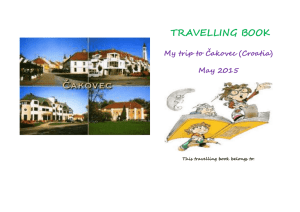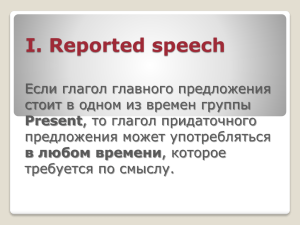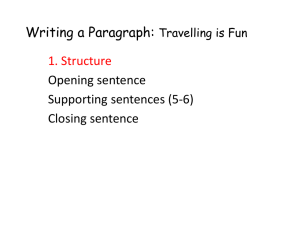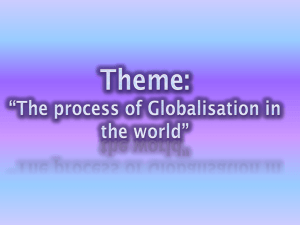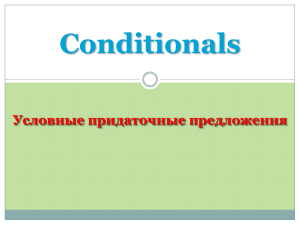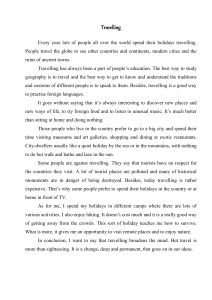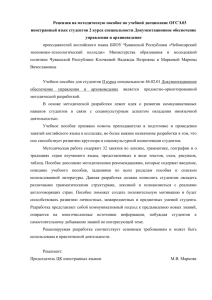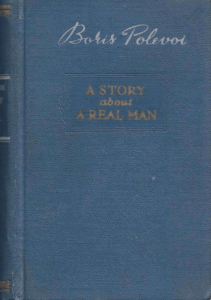Travelling & Transport Text with Conditional Sentences
advertisement
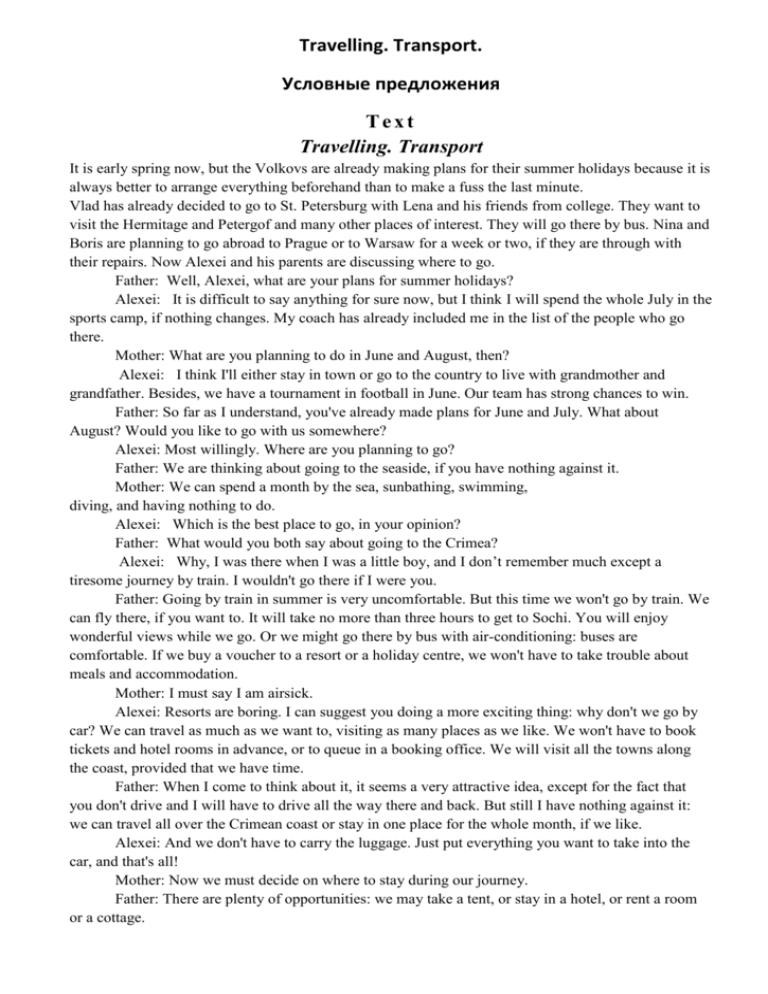
Travelling. Transport.
Условные предложения
Text
Travelling. Transport
It is early spring now, but the Volkovs are already making plans for their summer holidays because it is
always better to arrange everything beforehand than to make a fuss the last minute.
Vlad has already decided to go to St. Petersburg with Lena and his friends from college. They want to
visit the Hermitage and Petergof and many other places of interest. They will go there by bus. Nina and
Boris are planning to go abroad to Prague or to Warsaw for a week or two, if they are through with
their repairs. Now Alexei and his parents are discussing where to go.
Father: Well, Alexei, what are your plans for summer holidays?
Alexei: It is difficult to say anything for sure now, but I think I will spend the whole July in the
sports camp, if nothing changes. My coach has already included me in the list of the people who go
there.
Mother: What are you planning to do in June and August, then?
Alexei: I think I'll either stay in town or go to the country to live with grandmother and
grandfather. Besides, we have a tournament in football in June. Our team has strong chances to win.
Father: So far as I understand, you've already made plans for June and July. What about
August? Would you like to go with us somewhere?
Alexei: Most willingly. Where are you planning to go?
Father: We are thinking about going to the seaside, if you have nothing against it.
Mother: We can spend a month by the sea, sunbathing, swimming,
diving, and having nothing to do.
Alexei: Which is the best place to go, in your opinion?
Father: What would you both say about going to the Crimea?
Alexei: Why, I was there when I was a little boy, and I don’t remember much except a
tiresome journey by train. I wouldn't go there if I were you.
Father: Going by train in summer is very uncomfortable. But this time we won't go by train. We
can fly there, if you want to. It will take no more than three hours to get to Sochi. You will enjoy
wonderful views while we go. Or we might go there by bus with air-conditioning: buses are
comfortable. If we buy a voucher to a resort or a holiday centre, we won't have to take trouble about
meals and accommodation.
Mother: I must say I am airsick.
Alexei: Resorts are boring. I can suggest you doing a more exciting thing: why don't we go by
car? We can travel as much as we want to, visiting as many places as we like. We won't have to book
tickets and hotel rooms in advance, or to queue in a booking office. We will visit all the towns along
the coast, provided that we have time.
Father: When I come to think about it, it seems a very attractive idea, except for the fact that
you don't drive and I will have to drive all the way there and back. But still I have nothing against it:
we can travel all over the Crimean coast or stay in one place for the whole month, if we like.
Alexei: And we don't have to carry the luggage. Just put everything you want to take into the
car, and that's all!
Mother: Now we must decide on where to stay during our journey.
Father: There are plenty of opportunities: we may take a tent, or stay in a hotel, or rent a room
or a cottage.
Alexei: Living in a tent is a bad idea. What if it rains? And, besides, it will occupy too much
room in the car if we take it.
Mother: All right, dear. We will rent a room or stay in a hotel, then.
Father: Now we'd better take a map and choose the best route for our journey.
On Travelling
People started travelling in the ancient times. The first travelers were pilgrims, nomads and
explorers. Travelling was really dangerous in those days, but there were always brave and daring
people who went on discovering new lands, in search of wealth and fame.
Nowadays things have changed significantly. Hundreds of companies are willing to help you if
you are planning to go somewhere. You are free to choose where to go: you may want to spend a
vacation in the mountains or by the sea, and a plane will take you to the place of your choice in a matter
of hours. A lot of people will cater to the needs of the travelers in hotels and holiday centres all over the
world. Visitors are amused and taken care of in any possible way.
Holidaymaking has become one of the most profitable industries, and the budget of many
countries, such as Turkey, Egypt and Greece depends on tourism a lot. Travelling has become easier —
and maybe less exciting.
14
3
Exercises
1. Speak about holiday plans of the Volkovs' family.
2. Make up ten questions on the text.
3. Answer the following questions:
1. Do you like travelling?
2. Do you travel a lot?
3. Where did you travel lately?
4. Why do people like travelling?
5. What is the fastest kind of transport?
6. What way of transport is the most comfortable?
7. What kind of transport do you prefer?
8. Have you ever been in a holiday centre?
9. Have you ever travelled by sea? Did you like it? Are you seasick/ airsick?
10. Do you usually make new friends when travelling?
11. Why do some people prefer hiking to other kinds of travelling?
12. Why are holidays the best time for travelling?
13. What preparations do you usually make before a journey?
14. Where do people buy railway tickets?
15. When did you first travel by air?
16. Is travelling by air more expensive than air travel?
17. How many railway stations are there in your native city?
18. What are the advantages and disadvantages of travelling by car?
19. What can people do during a journey by train?
20. Are you planning to go anywhere this year?
4. Make up sentences using the table below
When people travel
they usually
go to some places of interest.
When we travel
we sometimes
meet a lot of people.
they often
make new friends
we seldom
visit museums and art galleries.
enjoy sightseeing
watch beautiful sunsets and sunrises
spend a lot of money.
on foot
stay in hotels and holiday centres.
by bus
see the wildlife in the forests.
by train
by plane
by air
by water
5. Speak about different kinds of transport using the table below
Trains are
Planes are
Buses are
Ships and ferries are
the most convenient
the fastest
the most expensive
the safest
the slowest
the cheapest
the best
the worst
way of travelling.
6. Translate into English
Современная жизнь невозможна без путешествий. Существуют различные способы путешествовать: можно
путешествовать на машине, на самолете, на поезде, на автобусе и даже пешком. Каждый вид транспорта имеет свои
преимущества. Быстрее всего путешествовать на самолете, самый удобный и романтичный вид путешествия — по
морю. Если вы не хотите беспокоиться о багаже и покупать билеты, вам, разумеется, следует отправляться в
путешествие на машине. Путешествуя пешком, можно наслаждаться прекрасной природой и видами, а также
посетить те места, куда нельзя добраться никаким транспортом.
Условные предложения
В английском языке можно выделить три типа условных предложений.
1. Предложения, выражающие реальную возможность. В них глагол в
придаточном предложении стоит в настоящем времени, а в главном — в
будущем:
If he comes, we shall start the work. Если он придет, мы начнем работу.
Present
Future
2. Предложения, выражающие маловероятное или нереальное условие,
относящееся к настоящему или к будущему. В них в придаточном предложении
глагол употребляется в форме прошедшего времени (Past Simple), а в главном
предложении вспомогательные глаголы будущего времени shall и will принимают
соответственно форму should и would (так называемое «будущее в прошедшем» —
Future in the Past):
If he came (Past Simple), we should start
(Future in the Past)the work.
Если бы он пришел, мы начали бы
работу.
Строго говоря, здесь употребляются формы Subjunctive. В придаточном предложении употребляется простая форма Past Subjunctive, а в главном предложении —
составная форма Subjunctive Simple со вспомогательными глаголами should и
would. Но форма Past Subjunctive существует только для глагола to be (were для
всех лиц), а для остальных глаголов в этом значении используется Past Simple. В
главном предложении формы Subjunctive Simple образуются так же, как и формы
Future in the Past (см. раздел «Согласование времен»). Поэтому гораздо проще
запомнить переход от первого типа условных предложений ко второму, используя
логику перехода настоящего времени в прошедшее, а будущего — в будущее в
прошедшем. Обращайте внимание на глагол to be:
If he were (Past Subjunctive от глагола to be)
free, he would be here.
Если бы он был свободен, он был бы
здесь.
3. Предложения, выражающие нереальное или невыполненное условие в прошлом.
В них в придаточном предложении употребляется глагол в Past Perfect, а в главном
Future Perfect in the Past (т. е. глаголы shall и will меняются соответственно на
should и would).
If he had come (Past Perfect) yesterday, we
Если бы он пришел вчера, мы начали бы
should have started (Future Perfect in the
Past)the work
работу.
Учтите, что иногда возникают ситуации, когда условие и следствие относятся к
различным временам (например, придаточное предложение относится к
прошедшему времени, а главное — к настоящему или будущему, или наоборот).
Тогда образуются условные предложения смешанного типа:
If they knew the language, (2-й тип)they would have gone abroad last year.( 3-й тип)
Если бы они знали язык, они уехали бы за границу в прошлом году.
If he had been there (3-й тип), we should go there too (2-й тип)
Если бы он уже побывал там, мы тоже поехали бы туда.
Кроме союза if придаточные условные предложения могут присоединяться к
главному следующими союзами:
Unless
если не
provided (that)
providing (that)
при условии если, при условии что
on condition (that)
in case (that)
supposing (that)
suppose (that)
They will go there provided that the safety
measures are strictly observed.
в случае (если)
если бы, если предположить
Они поедут туда при условии, что меры
безопасности будут строго соблюдены.
С союзом unless сказуемое в придаточном предложении употребляется в утвердительной
форме:
Не will help us unless he leaves.
Он поможет нам,
если только он не уедет.
Контрольные вопросы:
1. Какие типы условных предложений имеются в английском языке?
2. Как они образуются?
3. В чем отличие глагола to be от остальных глаголов при образовании
условных предложений?
4. Когда следует употреблять условные предложения смешанного типа и
как они образуются?
5. Какие союзы, кроме союза if, могут использоваться для образования
условных предложений?
EXERCISES
1. Translate into English
(a)
1. If we have a test today, I will get an excellent mark.
2. I will cook a festive dinner provided that you return from the country in time.
3. They will wait for you in case that you need their help.
4. She will not get up unless somebody wakes her.
5. They will travel to the Crimea by car provided that they book the hotel rooms.
6. If you call us at six o'clock, we won't be late.
7. Mother will cook the cake if you wash the dishes afterwards.
(b)
1. If they came, we should start the work.
2. If you brought me the railway timetable, I should choose the best train for us.
3. If he were with us, he would find the way out.
4. I should go by car if I were you.
5. You would have no problems if you drove instead of taking a bus.
6. They wouldn't take a tent if they knew how much room it occupies.
7. You would like her if you saw her.
(с) 1. If they had started their work yesterday, they would have finished it already.
2. If he hadn't called me, I shouldn't have come.
3. If they had bought a voucher to a resort, they would have spent a better summer
holiday.
4. They wouldn't have queued to buy the tickets if they had decided to hike.
5. If he had been here, he would have solved the problem at once.
2. Answer the questions. Make use of the words in the second column.
Model: Will you cook dinner? {do my homework) I will cook dinner if I do my
homework.
Will you come to our place?
have time
Will they come with us?
do their homework
Will she pass her test in English?
work a lot
Will you help me?
help me first
Will Mike finish his work?
be clever enough
Will we travel by train?
book the tickets
Will you go to the south in summer?
have money
Will Kate travel by plane?
not to be airsick
Will you book a ticket for me?
tell me the time of the departure
Will you translate this sentence?
give me the dictionary
Will he write a letter to his friends?
miss them
3. Transform the sentences according to the models.
Model 1: I will write letters to you. You will give me the address. — I will write
letters to you if you give me the address.
1. They will tell you all they know. They will come to see you.
2. She will take the children out for a walk. It will stop raining.
3. I shall buy the vouchers today. I shall get the money from the bank.
4. There will be enough room in the car. They won't take a tent with them.
5. They won't have to bother about the accommodation. They will buy vouchers to a
holiday centre.
6. She will come to see me. She will have time.
7. They will arrange everything for the party. His mother will help them.
Model 2: They would read the book. They would have time. — They would read
the book if they had time.
1. They would watch the film. You would bring them the cassette.
2. He would remember me. He would see me.
3. They would sunbathe. They would go to a holiday centre.
4. My friends would go to Turkey. They would be through with the repairs.
5. The Browns would queue for the tickets. They wouldn't buy them in advance.
6. I would read a book. The journey would be tiresome.
7. You would enjoy the countryside. You would travel by train.
Model 3: I would have spoken to him. (see him) —
I would have spoken to him if I had seen him.
1.They would have traveled by car. (think about this opportunity beforehand)
2.Alexei would have stayed at his grandparents last year, (not to go to the sports
camp) .
3.His friends would have chosen a present for him. (tell them about his birthday
beforehand)
4.I should have read this book, (give it to me last шеек)
5.My parents would have bought a voucher for me. (tell them about my plans)
6.They wouldn't have gone abroad on vacation, (buy the furniture for the kitchen)
7. We wouldn't have had to queue in the booking office for three hours, (buy the
tickets in advance)
4. Translate into English.
1. Если у вас есть время, напишите письмо друзьям.
2. В случае если погода будет хорошая, мы будем купаться и загорать.
3. Если ты поедешь поездом, тебе лучше купить билеты заранее.
4. Если ты останешься у нас еще на два дня, я покажу тебе все
достопримечательности Петербурга.
5. Я напишу вам, если у меня будет время.
6. Если бы ты так не беспокоился, мы отдохнули бы лучше.
7. Вид побережья был бы красивым, если бы его не портили палатки туристов.
8. Мы поехали бы на машине, если бы продумали маршрут заранее.
9. Я не беспокоилась бы так, будь я на вашем месте.
10. Если бы он был дома, он ответил бы на телефонный звонок.
TRAVELLING
Word list
Summer holidays
To arrange beforehand
To make a fuss the last minute
To decide
To go by bus
To go abroad
To discuss where to go
What are your plans for summer
holidays?
I’ll go to
I think I’ll spend July in sports camp
So far as I understand
To make plans for June
To spend a month by the sea
To sunbathe
To swim
To dive
A tiresome journey by train
To enjoy wonderful views
Bus with air-conditioning
Buses are comfortable
A resort
Accommodation
To be airsick
To book tickets in advance
To queue in a booking office
An attractive idea
To carry the luggage
To take a tent
To stay in a hotel
To rent a room
To take a map
To choose the best route
Advanced
Ancient times
The first travelers
Pilgrim
Nomads
Explorers
To search wealth and fame
To change significantly
To be free to choose
To amuse
Holidaymaking
Profitable industry
The budget of the country
